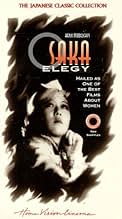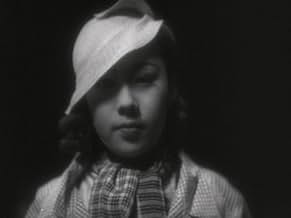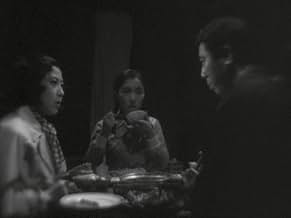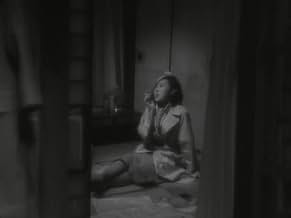Naniwa erejî
- 1936
- 1h 11m
ÉVALUATION IMDb
7,2/10
2,7 k
MA NOTE
Une jeune femme devient la maîtresse de son patron pour pouvoir subvenir aux besoins de sa famille.Une jeune femme devient la maîtresse de son patron pour pouvoir subvenir aux besoins de sa famille.Une jeune femme devient la maîtresse de son patron pour pouvoir subvenir aux besoins de sa famille.
Avis en vedette
An exceptional film in that it redefines that cinematic, to a degree literary, trope, the femme-fatal. In this film we watch from her perspective. Her transgressions seem themselves a kind of victimization. Not only is sexuality the only tool a woman is given to empower herself in society, but her dignity and her sexuality are therefor put in an antagonistic relation to each other. Sexuality and sincerity become mutually exclusive in the world Mizoguchi paints. The cinematography is magnificent. Everyone looks compromised. But the last shot lets us know which victim's compromise cuts the deepest and. A feminist work in the most profound sense.
Ayako (Isuzu Yamada) becomes the mistress of her boss, Mr. Asai, so she can pay her father's debt, and prevent him from going to prison for embezzlement. She also sends money to her brother Hiroshi to pay his university tuition, but her father intercepts it.
Mizoguchi considered the film his first serious effort as a director, and while I am not familiar with his earlier work, I have to say this is the kind of film that leaves a mark. Either Mizoguchi or his cinematographer had an excellent awareness of the camera -- the door closing to block the camera early on in the film -- years ahead of its time.
The subject matter in general is impressive. I am not sure what the typical morality was in pre-war Japan, but to feature adultery and whatnot in the 1930s seems quite bold.
Mizoguchi considered the film his first serious effort as a director, and while I am not familiar with his earlier work, I have to say this is the kind of film that leaves a mark. Either Mizoguchi or his cinematographer had an excellent awareness of the camera -- the door closing to block the camera early on in the film -- years ahead of its time.
The subject matter in general is impressive. I am not sure what the typical morality was in pre-war Japan, but to feature adultery and whatnot in the 1930s seems quite bold.
There are so many interesting things going on in this film, and several of them surprised me. I loved Ayake (played by Isuzu Yamada) and the voices of the women in general. I couldn't help but contrast Ayake's headstrong will and fierceness to Yasujiro Ozu's Noriko in Tokyo Story (played by Setsuko Hara). Noriko was the perfect picture of traditional grace and dedication in a Japanese woman and she fit in perfectly with Ozu's straight lines and symmetrical framing. Ayake, on the other hand, is shadowed by an almost conspiratorial camera which cleverly spies on the fore and background simultaneously, and creeps behind walls and curtains to follow the characters and listen in on their conversations, amplifying the sense of daring and defiance of Ayake's character. The inventiveness of so many varying shots stole my attention more than anything else, though I also appreciated the quick and steady pacing of the story as it unfolded, predominantly led by Ayake.
http://funkyforestfirstcontact.wordpress.com/i-just-saw/
http://funkyforestfirstcontact.wordpress.com/i-just-saw/
10Gonzo-23
It was this film alone that drove me into an intense obsession with cinema. Mizoguchi is the great Japanese master, and Osaka Elegy reveals his genius. From his long take compositions that are taxed with complexity and tension, to his ambigious depictions of character, I felt like I had grown after I had seen this film. Notice the national allegory at the film's conclusion, a confused and lonely Japan. And his inconclusive final shot taken many years before the well known 400 Blows. The devastating melodrama is not undercut by any cinematic manipulation. I highly recommend this to any lover of the cinematic medium. Also, I am a sucker for self-reflexive Kabuki theater sequences...
...with a plot out of Precode Hollywood and frequent jazz music to match. A pretty young switchboard operator reluctantly decides to become the mistress of her boss so she can help her financially-strapped father who had embezzled company funds for an investment that went bad, and her college-student brother who needs his tuition paid. Of course she is ostracized from the family for her immorality without giving her the chance to explain how they got their money. Various other relationships and subplots also come into play. This one has nicely-plotted character dynamics, good performances, and beautiful cinematography.
Le saviez-vous
- Citations
Junzo Murai: You're a woman... Being taken to the police station... Getting thrown into jail... You've done shameful things. You ungrateful child!
Ayako Murai: How could you say that? I never expected that I'd be treated like this when I came home. This is ridiculous! I thought you would welcome me with open arms. If I'd have known this, I never would have come back.
- ConnexionsFeatured in Century of Cinema: Nihon eiga no hyaku nen (1995)
Meilleurs choix
Connectez-vous pour évaluer et surveiller les recommandations personnalisées
- How long is Osaka Elegy?Propulsé par Alexa
Détails
- Durée1 heure 11 minutes
- Couleur
- Mixage
- Rapport de forme
- 1.37 : 1
Contribuer à cette page
Suggérer une modification ou ajouter du contenu manquant

Lacune principale
By what name was Naniwa erejî (1936) officially released in India in English?
Répondre






















